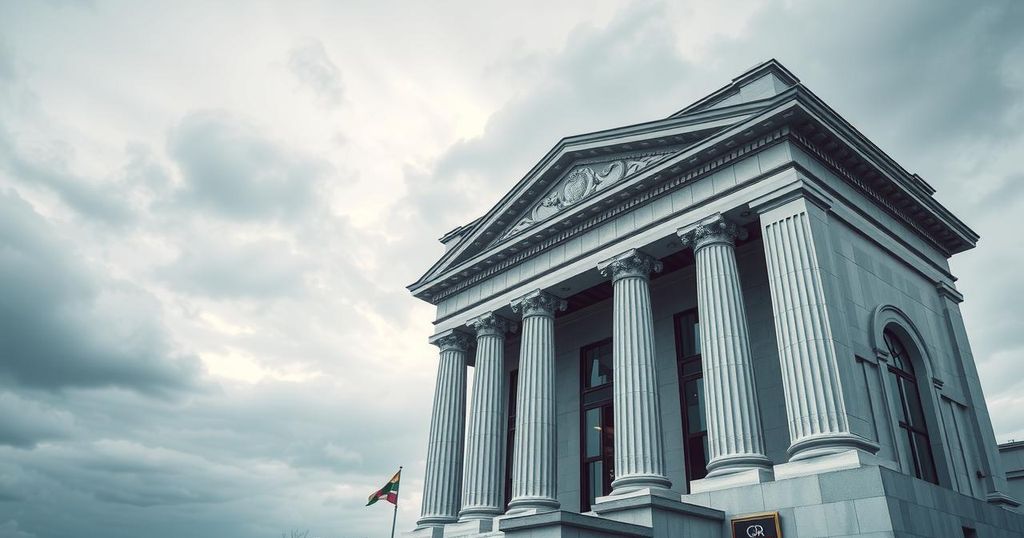The debate over Iran’s FATF membership showcases an ideological divide between proponents seeking economic integration and critics fearing loss of sovereignty. Discussions involve essential legislation aimed at removing Iran from the FATF blacklist, which could enhance its access to global financial markets. Decisions made now will significantly influence Iran’s economic and geopolitical future.
Fast Summary
The ongoing debate regarding Iran’s possible membership in the Financial Action Task Force (FATF) reveals contrasting viewpoints on its economic benefits and national sovereignty concerns. Proponents argue for enhanced global integration and economic benefits, while opponents fear loss of sovereignty and national security risks. Current discussions in Iran’s Expediency Discernment Council regarding crucial laws are imperative for potential FATF compliance.
—
Article Body
The discussion about Iran’s potential entry into the Financial Action Task Force (FATF) has generated significant debate among various stakeholders, including the public and political leaders. Advocates contend that joining the FATF would enable Iran to integrate more effectively into the global financial system, attracting foreign investment and reducing banking restrictions that hinder economic growth. They argue that improved international cooperation is essential to addressing economic challenges.
Conversely, critics perceive the FATF as a foreign imposition that could undermine Iran’s sovereignty. They draw historical parallels to the 19th-century Treaty of Turkmenchay, suggesting that FATF membership might enable foreign interference in internal affairs and infringe upon the Iranian Constitution’s protective provisions.
The FATF, established in 1989, is an intergovernmental organization aimed at combating money laundering and terrorism financing. Following the 9/11 attacks, its focus expanded to scrutinize financial activities linked to designated terrorist groups. Its ongoing monitoring efforts target sources of funding for these groups, leading to controversial listings of entities like Hezbollah, which some view as essential to Iran’s strategic defense.
As a political organization, the FATF asserts its role in fostering necessary reforms to combat financial crimes and protect the integrity of the global financial system. Influential reports and evaluations issued by the FATF determine investment risk levels in countries, significantly impacting financial decisions and international relations.
The FATF comprises 39 members, including 37 countries and two regional organizations. Members such as the United States, China, and Germany collaborate with observers like the European Union and the Gulf Cooperation Council to enforce global financial regulations. This diverse membership elevates the organization’s authority within the international financial landscape.
Supporters of Iran’s FATF membership advocate for strategic integration, arguing that it is crucial for combating terrorism and facilitating international financial transactions. Joining the FATF could lessen Iran’s economic isolation, enabling it to transcend current limitations on foreign investment and trade relations.
Opponents, however, emphasize concerns about transparency and potential self-imposed sanctions. They argue that aligning with FATF regulations would provide adversaries with sensitive information about Iran’s economy, making the country vulnerable to strategic targeting. They also express alarm that membership could disrupt alliances critical to Iran’s regional policies.
A moderate perspective recognizes both the advantages and risks associated with FATF membership. Experts suggest that while economic opportunities may arise, careful analysis is necessary to ensure that national interests remain intact. Given Iran’s unique circumstances, a cautious approach to FATF engagement is recommended.
Currently, the Expediency Discernment Council debates essential legislation regarding combating terrorism financing and organized crime. The passage of these laws would be pivotal for Iran’s potential FATF compliance, impacting both its geopolitical standing and its access to the global financial system. The Iranian Parliament previously discussed this, but progress has stalled, with the deadline for legislative review having expired.
—
Background
The Financial Action Task Force (FATF) serves as a critical component of international financial governance, promoting standards to prevent money laundering and terrorism financing. Its effectiveness stems from broad international participation, which helps shape global financial policies. Given Iran’s complex economic and political landscape, the country’s discussions about FATF membership reflect deep-rooted concerns about sovereignty versus the benefits of global integration.
—
Quotes
No direct quotes were provided within the article.
—
Proof to Links
No links were mentioned in the article.
—
Conclusion
The debate regarding Iran’s potential FATF membership highlights contrasting opinions on economic integration and national autonomy. Advocates emphasize the positive implications for financial stability and foreign investment, while critics caution against the possible erosion of sovereignty and security risks. The outcome of legislative discussions around critical bills could determine Iran’s future path in relation to global financial systems and its international standing.
The topic centers around Iran’s deliberation on whether to join the Financial Action Task Force (FATF), an international body that sets standards for combating money laundering and terrorism financing. The discussions reflect conflicting views within Iran about the benefits of integrating into the global economy versus the perceived risks to national sovereignty. The FATF’s influence is paramount in affecting international banking relationships and financial regulations across member countries.
Ultimately, Iran faces a pivotal decision regarding FATF membership, balancing the potential economic benefits against concerns for national sovereignty and security. The ongoing legislative discussions will be critical in shaping the country’s future engagement with the global financial system and addressing its economic needs without compromising its strategic interests.
Original Source: www.tehrantimes.com






